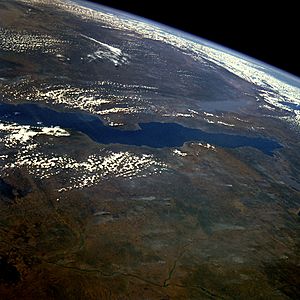Lake Tanganyika facts for kids

Lake Tanganyika is a huge lake located in the Great Rift Valley of central Africa. It's like a giant, long ribbon of water! This amazing lake is shared by four different countries: Burundi, the Democratic Republic of the Congo (DRC), Tanzania, and Zambia.
It's known for being the longest fresh water lake in the entire world. It's also the second deepest lake on Earth, which means it goes down a very, very long way!
Contents
A Giant Lake in Africa
Lake Tanganyika is truly enormous. It stretches for about 673 kilometers (418 miles) from north to south. That's longer than the distance from London to Paris! It's also about 50 kilometers (31 miles) wide on average.
How Deep is Lake Tanganyika?
This lake is incredibly deep. Its deepest point is about 1,470 meters (4,820 feet). That's almost as deep as five Eiffel Towers stacked on top of each other! Because it's so deep, the water at the bottom doesn't mix with the water at the top. This creates different layers of water.
Where is the Lake Located?
Lake Tanganyika sits right in the middle of Africa. It's part of the Great Rift Valley, which is a huge crack in the Earth's surface. This valley was formed over millions of years as the Earth's plates moved apart. The lake fills up a big part of this rift.
Amazing Animals of Lake Tanganyika
Lake Tanganyika is famous for its incredible variety of fish and other creatures. Many of the animals found here live nowhere else in the world!
Fish Species
The lake is home to more than 2,000 different kinds of animals. Over 250 types of fish live here, and most of them are a type called cichlids. These cichlids come in all sorts of colors and shapes. They have adapted to live in different parts of the lake, from the rocky shores to the open water.
Cichlids and Their Life Cycle
Cichlids are very interesting fish. Many of them are known for their unique ways of caring for their young. Some cichlids, like the Neolamprologus brichardi, are popular in aquariums because of their cool behaviors. They can be very territorial and even work together to protect their babies.
Other Lake Creatures
Besides fish, you can find other amazing animals in Lake Tanganyika. There are special kinds of snails, crabs, and even sponges that live only in this lake. Some of these creatures have developed unusual shapes and features, like the spiny shell of the Tiphobia horei snail.
People and the Lake
Many people live around Lake Tanganyika. They depend on the lake for their lives and livelihoods.
Fishing in the Lake
Fishing is a very important activity for the people living near the lake. They catch fish to eat and to sell. Some of the most common fish caught include different types of cichlids and sardines. Fishing boats can often be seen on the lake, especially in areas like Kagongo Ward in Tanzania.
Water Use
The lake also provides water for drinking, washing, and farming for the communities nearby. It's a vital resource for millions of people in the four countries that share it.
Images for kids
-
One of the many Tanganyika cichlids is Neolamprologus brichardi. The complex behaviors of this species and its close relative N. pulcher have been studied in detail
-
The shell of the endemic thalassoid freshwater snail Tiphobia horei with its elaborate shape and spines.
-
Bathybatini (E): Bathybates ferox is benthic and piscivorous, but the genus also includes pelagic species. The tribe is sometimes split in three, others being Hemibatini and Trematocarini
-
Boulengerochromini (E): Boulengerochromis microlepis is one of the world's largest cichlids and only member of its tribe
-
Cyphotilapiini (E): Cyphotilapia frontosa, one of only two similar species in the tribe
-
Haplochromini: Astatotilapia burtoni is one of the few Tanganyika species, unlike other African Great Lakes where most belong to this tribe
-
Lamprologini (E): Julidochromis marlieri is popular in the aquarium trade where members of the genus are known as "Julies"
-
Tropheini (E): Tropheus moorii ("red" Chimba morph) is highly variable and the taxonomy of some of the morphs is questionable
See also
 In Spanish: Lago Tanganica para niños
In Spanish: Lago Tanganica para niños
 | Sharif Bey |
 | Hale Woodruff |
 | Richmond Barthé |
 | Purvis Young |




















